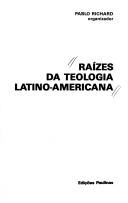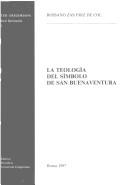| Listing 1 - 10 of 19 | << page >> |
Sort by
|

ISBN: 9977904146 9789977904146 Year: 1985 Publisher: San José DEI - Departamento Ecuménico de Investigaciones
Abstract | Keywords | Export | Availability | Bookmark
 Loading...
Loading...Choose an application
- Reference Manager
- EndNote
- RefWorks (Direct export to RefWorks)
Theology, Doctrinal --- History --- Christian doctrines --- Christianity --- Doctrinal theology --- Doctrines, Christian --- Dogmatic theology --- Fundamental theology --- Systematic theology --- Theology, Dogmatic --- Theology, Systematic --- Doctrines --- Theology --- Theology, Doctrinal - Latin America - History
Book
ISBN: 8460064972 9788460064978 Year: 1974 Volume: 2 Publisher: Madrid Fundación universitaria española
Abstract | Keywords | Export | Availability | Bookmark
 Loading...
Loading...Choose an application
- Reference Manager
- EndNote
- RefWorks (Direct export to RefWorks)
Theology, Doctrinal --- 230.22 <460> "19" --- Christian doctrines --- Christianity --- Doctrinal theology --- Doctrines, Christian --- Dogmatic theology --- Fundamental theology --- Systematic theology --- Theology, Dogmatic --- Theology, Systematic --- Theology --- Katholieke dogmatische en systematische theologie--Spanje--20e eeuw. Periode 1900-1999 --- Doctrines
Book
ISBN: 9788431324636 8431324635 Year: 2007 Volume: 33 Publisher: Pamplona Universidad de Navarra
Abstract | Keywords | Export | Availability | Bookmark
 Loading...
Loading...Choose an application
- Reference Manager
- EndNote
- RefWorks (Direct export to RefWorks)
Theology, Doctrinal --- 248 <036> --- Spiritualiteit. Ascese. Mystiek. Vroomheid--Gidsen. Inleidingen --- Christian doctrines --- Christianity --- Doctrinal theology --- Doctrines, Christian --- Dogmatic theology --- Fundamental theology --- Systematic theology --- Theology, Dogmatic --- Theology, Systematic --- Theology --- Doctrines
Book
Abstract | Keywords | Export | Availability | Bookmark
 Loading...
Loading...Choose an application
- Reference Manager
- EndNote
- RefWorks (Direct export to RefWorks)
Theology, Doctrinal --- Christian doctrines --- Christianity --- Doctrinal theology --- Doctrines, Christian --- Dogmatic theology --- Fundamental theology --- Systematic theology --- Theology, Dogmatic --- Theology, Systematic --- Theology --- Doctrines --- Le Clerc, Jean --- Phereponus, Joannes --- Le Clerc, Jean. --- LE CLERC (JEAN), 1657-1736 --- CORRESPONDANCE
Book

ISBN: 9585498235 9585498200 Year: 2019 Publisher: Editorial Uniagustiniana
Abstract | Keywords | Export | Availability | Bookmark
 Loading...
Loading...Choose an application
- Reference Manager
- EndNote
- RefWorks (Direct export to RefWorks)
Debate is ongoing about Augustine’s political philosophy, and more particularly about his views on the relations between Church and State. This volume brings together a number of contributions that examine Augustine’s theoretical views on the subject. Augustine assumed his responsibilities as a theologian and Church leader: the truth of the faith and the unity of the Church could not be compromised. He did not hesitate to appeal to the civil authorities in the pursuit of this goal. In fact, he even ventured to deploy the civil authority, the emperor, against an ecclesiastical authority such as Pope Zosimus. This appeal to the secular arm of power was inspired on the one hand by Augustine’s concern for the preservation of order and peace, and on the other by his faith in the rights of truth. Yet this aspiration of Augustine’s was not absolute either. He rejected the idea that humans should be converted forcibly, against their will. He also condemned anything that compromised the physical integrity of human beings. In short, Augustine also recognised the value of the political system. This served to safeguard the good ends of earthly life, i.e. peace and justice. But Augustine believed this earthly peace and justice were reflections of the heavenly peace and justice, which are the foundation of earthly order and stability.
Good and evil. --- Theology, Doctrinal. --- Bien y mal. --- Teología dogmática. --- Agustin of Hippo, --- Agustín, --- Philosophy. --- pensamiento filosófico. --- Christian doctrines --- Christianity --- Doctrinal theology --- Doctrines, Christian --- Dogmatic theology --- Fundamental theology --- Systematic theology --- Theology, Dogmatic --- Theology, Systematic --- Theology --- Evil --- Wickedness --- Ethics --- Philosophy --- Polarity --- Religious thought --- Doctrines --- Political philosophy --- Political theology --- Augustine of Hippo --- Patristics --- Peace and justice
Book
ISBN: 9585498227 9585498197 Year: 2018 Publisher: Editorial Uniagustiniana
Abstract | Keywords | Export | Availability | Bookmark
 Loading...
Loading...Choose an application
- Reference Manager
- EndNote
- RefWorks (Direct export to RefWorks)
Analizar la filosofía política de Agustín es un debate actual, particularmente su reflexión sobre la iglesia y el estado. Esta obra recopila una serie de contribuciones que examinan las perspectivas teóricas de Agustín a este respecto. Agustín comprendió sus responsabilidades como líder de la teología y de la iglesia: la veracidad de la fe y la unidad de la iglesia no podían comprometerse. Nunca dudó en apelar a las actividades civiles con el fin de lograr su objetivo. De hecho, se aventuró a expandir la autoridad civil, al emperador, contra una autoridad eclesiástica como la del papa Zósimo. Esta apelación al brazo secular del poder estuvo influenciada, de un lado, por la preocupación de Agustín sobre la preservación del orden y la paz y, de otro, por su creencia del derecho a la verdad; aunque esta aspiración de Agustín no fue del todo absoluta. Rechazó la idea de que los humanos se debían convertir a la fuerza, contra su voluntad. También condenó cualquier cosa que comprometiera la integridad física de los seres humanos. En resumen, Agustín reconoció el valor del sistema político, lo cual sirvió para salvaguardar los buenos fines de la vida terrenal: la paz y la justicia. No obstante, Agustín creía que la paz y la justicia terrenal eran reflejos de la paz y la justicia celestial, pues es esto último la base del orden y la estabilidad en la tierra.
Good and evil. --- Theology, doctrinal. --- Bien y mal. --- Teología doctrinal. --- Augustine, Saint, --- Agustín, Santo, --- Criticism and interpretation. --- Crítica e interpretación. --- Christian doctrines --- Christianity --- Doctrinal theology --- Doctrines, Christian --- Dogmatic theology --- Fundamental theology --- Systematic theology --- Theology, Dogmatic --- Theology, Systematic --- Theology --- Evil --- Wickedness --- Ethics --- Philosophy --- Polarity --- Religious thought --- Doctrines --- paz y justicia --- Agustín de Hipona --- filosofía política --- teología política --- patrística

ISBN: 8876527524 9788876527524 Year: 1997 Volume: 5 Publisher: Roma Pontificia Università Gregoriana
Abstract | Keywords | Export | Availability | Bookmark
 Loading...
Loading...Choose an application
- Reference Manager
- EndNote
- RefWorks (Direct export to RefWorks)
Symbolism --- Theology, Doctrinal --- Philosophy, Medieval --- History --- 2 BONAVENTURA --- -Christian doctrines --- Christianity --- Doctrinal theology --- Doctrines, Christian --- Dogmatic theology --- Fundamental theology --- Systematic theology --- Theology, Dogmatic --- Theology, Systematic --- Theology --- Representation, Symbolic --- Symbolic representation --- Mythology --- Emblems --- Signs and symbols --- Medieval philosophy --- Scholasticism --- Godsdienst. Theologie--BONAVENTURA --- -Doctrines --- Bonaventure Saint, Cardinal --- Theses --- -Godsdienst. Theologie--BONAVENTURA --- -Bonaventure Saint, Cardinal --- 2 BONAVENTURA Godsdienst. Theologie--BONAVENTURA --- -Representation, Symbolic --- Christian doctrines --- Bonaventure, --- Boaventura, --- Bonaventura, --- Bonawentura, --- Boneventura, --- Buenaventura, --- Būnāwintūrā, --- Fidanza, Giovanni, --- Sheng Wen-te, --- Wen-te, --- Pseudo-Bonaventure --- Theology, Doctrinal - History - Middle Ages, 600-1500
Book
ISBN: 8422007320 9788422007326 Year: 1975 Volume: 378 Publisher: Madrid Biblioteca de autores cristianos
Abstract | Keywords | Export | Availability | Bookmark
 Loading...
Loading...Choose an application
- Reference Manager
- EndNote
- RefWorks (Direct export to RefWorks)
Theology, Doctrinal --- Catholic Church --- Doctrines --- 234.2 --- Leer van het geloof. De Fide --- 234.2 Leer van het geloof. De Fide --- Christian doctrines --- Christianity --- Doctrinal theology --- Doctrines, Christian --- Dogmatic theology --- Fundamental theology --- Systematic theology --- Theology, Dogmatic --- Theology, Systematic --- Theology --- Doctrines. --- Church of Rome --- Roman Catholic Church --- Katholische Kirche --- Katolyt︠s︡ʹka t︠s︡erkva --- Römisch-Katholische Kirche --- Römische Kirche --- Ecclesia Catholica --- Eglise catholique --- Eglise catholique-romaine --- Katolicheskai︠a︡ t︠s︡erkovʹ --- Chiesa cattolica --- Iglesia Católica --- Kościół Katolicki --- Katolicki Kościół --- Kościół Rzymskokatolicki --- Nihon Katorikku Kyōkai --- Katholikē Ekklēsia --- Gereja Katolik --- Kenesiyah ha-Ḳatolit --- Kanisa Katoliki --- כנסיה הקתולית --- כנסייה הקתולית --- 가톨릭교 --- 천주교
Book
ISBN: 8430104380 9788430104383 Year: 1977 Publisher: Salamanca Sígueme
Abstract | Keywords | Export | Availability | Bookmark
 Loading...
Loading...Choose an application
- Reference Manager
- EndNote
- RefWorks (Direct export to RefWorks)
Liberation theology --- Theology, Doctrinal --- 241.1*31 --- 230.22 <8=6> --- -Christian doctrines --- Christianity --- Doctrinal theology --- Doctrines, Christian --- Dogmatic theology --- Fundamental theology --- Systematic theology --- Theology, Dogmatic --- Theology, Systematic --- Theology --- Theology of liberation --- Kairos documents --- Philosophy of liberation --- Politieke theologie. Bevrijdingstheologie. Ethiek van de revolutie --- Katholieke dogmatische en systematische theologie--Latijns Amerika --- Addresses, essays, lectures. --- Addresses, essays, lectures --- Doctrines --- -Politieke theologie. Bevrijdingstheologie. Ethiek van de revolutie --- 230.22 <8=6> Katholieke dogmatische en systematische theologie--Latijns Amerika --- 241.1*31 Politieke theologie. Bevrijdingstheologie. Ethiek van de revolutie --- -Theology of liberation --- Christian doctrines --- Theology, Doctrinal - Latin America
Periodical
ISSN: 00363537 Year: 1954 Publisher: Salamanca Universidad Pontificia de Salamanca
Abstract | Keywords | Export | Availability | Bookmark
 Loading...
Loading...Choose an application
- Reference Manager
- EndNote
- RefWorks (Direct export to RefWorks)
Théologie
---
Theology, Doctrinal
---
Rooms-katholicisme.
---
Theologie.
---
Christian doctrines
---
Christianity
---
Doctrinal theology
---
Doctrines, Christian
---
Dogmatic theology
---
Fundamental theology
---
Systematic theology
---
Theology, Dogmatic
---
Theology, Systematic
---
Theology
---
Doctrines
---
Catholic Church
---
Catholic Church.
---
Chiesa cattolica
---
Church of Rome
---
Ecclesia Catholica
---
Eglise catholique
---
Eglise catholique-romaine
---
Gereja Katolik
---
Iglesia Católica
---
Kanisa Katoliki
---
Katholikē Ekklēsia
---
Katholische Kirche
---
Katolicheskai͡a t͡serkovʹ
---
Katolicki Kościół
---
Katolyt͡sʹka t͡serkva
---
Kenesiyah ha-Ḳatolit
---
Kościół Katolicki
---
Kościół Rzymskokatolicki
---
Nihon Katorikku Kyōkai
---
Roman Catholic Church
---
Römisch-Katholische Kirche
---
Römische Kirche
---
#BIBC:tijdschradm
| Listing 1 - 10 of 19 | << page >> |
Sort by
|

 Search
Search Feedback
Feedback About
About Help
Help News
News